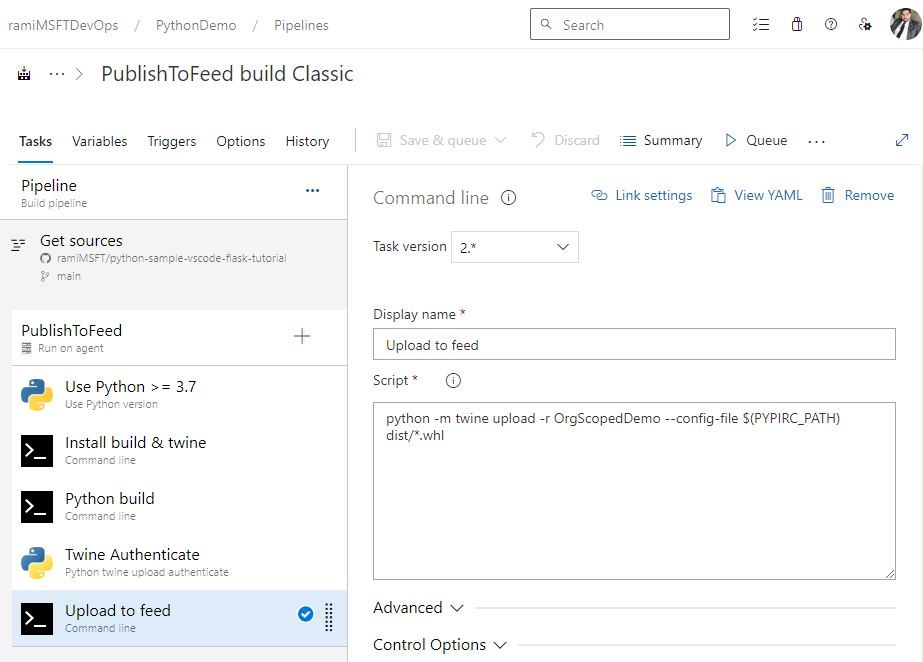Note
Access to this page requires authorization. You can try signing in or changing directories.
Access to this page requires authorization. You can try changing directories.
Azure DevOps Services | Azure DevOps Server 2022 - Azure DevOps Server 2019
Azure Pipelines enables developers to publish Python packages to Azure Artifacts feeds and public registries such as PyPi. This article will guide you through how to publish Python packages to your Azure Artifacts feed.
Prerequisites
An Azure DevOps organization and a project. Create an organization or a project if you haven't already.
An Azure Artifacts feed. Create a feed if you don't have one already.
Authenticate with a feed
To publish Python packages using twine, you must first authenticate with your Azure Artifacts feed. The TwineAuthenticate task provides twine credentials to a PYPIRC_PATH environment variable. This variable is then used bytwine to publish packages directly from your pipeline.
Important
The credentials stored in the PYPIRC_PATH environment variable take precedence over those in the .ini and .conf files.
If you add multiple TwineAuthenticate tasks at different stages in your pipeline, each task execution will extend (not override) the existing PYPIRC_PATH environment variable.
Sign in to your Azure DevOps organization, and then navigate to your project.
Select Pipelines, and then select your pipeline definition.
Select Edit, and then add the following snippet to your YAML pipeline.
steps: - task: UsePythonVersion@0 displayName: 'Use Python 3.x' - task: TwineAuthenticate@1 inputs: artifactFeed: <PROJECT_NAME/FEED_NAME> ## For an organization-scoped feed, use: artifactFeed: <FEED_NAME>
Publish Python packages to a feed
Note
To publish your packages to a feed using Azure Pipelines, make sure that both the Project Collection Build Service and your project's Build Service identities are assigned the Feed Publisher (Contributor) role in your feed settings. See Manage permissions for details.
Sign in to your Azure DevOps organization, and then navigate to your project.
Select Pipelines, and then select your pipeline definition.
Select Edit, and then add the following snippet to your YAML pipeline.
steps: - task: UsePythonVersion@0 displayName: 'Use Python 3.x' - script: | pip install build pip install twine displayName: 'Install build and twine' - script: | python -m build -w displayName: 'Python build' - task: TwineAuthenticate@1 inputs: artifactFeed: <PROJECT_NAME/FEED_NAME> ## For an organization-scoped feed, use: artifactFeed: <FEED_NAME> displayName: 'Twine Authenticate' - script: | python -m twine upload -r <FEED_NAME> --config-file $(PYPIRC_PATH) dist/*.whl displayName: 'Upload to feed'

